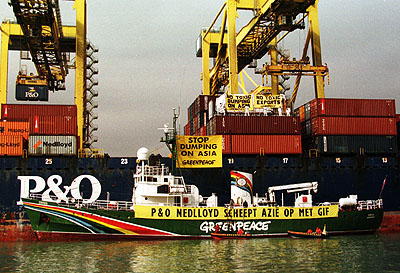
|
space Press Releases, News Stories |

|
PRESS RELEASE
"Old ships contain toxic materials. To sell these ships for demolition to a developing country without cleaning them first is not only morally wrong, it is also a clear violation of international agreements and European law." said Juantxo Lopez de Uralde of Greenpeace. The owner of Encounter Bay, Dutch-British P&O Nedlloyd, has sold seven ships that had reached the end of their life span, for demolition in India, Bangladesh and China since March this year, including two sister ships of the Encounter Bay. The ships are scrapped in crude working conditions and any useful material is sold for recycling. "The ships reaching the end of their life span during the next 20 years all contain hazardous substances like asbestos, lead paints, heavy metals and PCBs. These hazardous substances should be removed from the ships before the actual scrapping. The removal is a dirty and dangerous work. If it has to happen, it should be conducted only under the strictest safety standards", said Andreas Bernstorff of Greenpeace, who witnessed and documented the situation in India last month. Ships-for-scrap, unless cleaned of hazardous substances are 'contaminated metal scrap' and therefore subject to the Basel Convention which controls the transboundary movements of hazardous wastes and their disposal. The export of hazardous waste from OECD-countries to non-OECD countries is banned under the convention. The ban entered into force January this year in EU-countries. "We already have a difficult job at hand to make labour conditions at shipbreaking sites in South Asia safe. Hazardous wastes on ships make this task an impossible one. We demand that all European countries and companies take responsibility for removing all hazardous wastes on ships before they are readied for scrapping," said Ravi Agarwal of BAN in India. In Alang (India), the world's largest scrapping site for ocean going ships, it is normal practice to remove the carcinogenic asbestos with bare hands and without any breathing protection. Workers torchcut steel covered with centimetre thick paint layers, without protection against the fumes containing heavy metals. A large part of the toxics also ends up in the sea and in the agricultural hinterland. Greenpeace and BAN demand that P&O Nedlloyd and all other EU-based ship owners remove all hazards before exporting ships for demolition in Asia. The organisations also call for an independent toxics inventory of all ships owned by EU-based companies that are planned to be sold for scrapping in Asian countries. See: FACT SHEET: The Export of Toxic Ships to Asia More information: On MV Sirius in Barcelona,
In Germany, Andreas Bernstorff, +49-172-4533770
For further information, check the following Web sites:
More News |
|
|